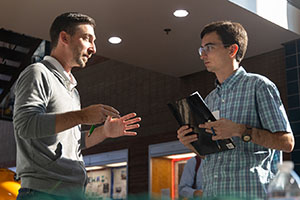Connecting with your professors: Your secret to success
There's a secret weapon to succeeding at college. Want to know what it is?
Your professors. Seriously, you might not know this, but they want you to succeed. They want you to ask them for help. They want to write you that great letter of recommendation.
From finding your favorite study spot on campus to joining a student organization, your journey as a CMU Chippewa starts with a campus visit.
Why your professors aren't actually scary
First things first—professors are regular humans who genuinely love their subjects and want to share that passion. They didn't sign up for years of education and research just to make your life difficult. Most of them remember what it was like to be in your shoes, and they're rooting for you.
How to email your professor (without freaking out)
 Let's face it—sending that first email to your professor can feel intimidating. Here's how to do it right:
Let's face it—sending that first email to your professor can feel intimidating. Here's how to do it right:
- Use your university email address (not your AwesomeDude98@hotmail.com address).
- Include a clear subject line with your course name and section number.
- Start with a professional greeting ("Dear Professor Smith" works great).
- Identify yourself and your class.
- Keep it concise and specific about what you need.
- End with a professional sign-off ("Thank you for your time" or "Regards")
Pro tip: Before hitting send, proofread it. Nothing screams "I don't care" like an email full of typos when you're asking for help. Get a second set of eyes to look it over, or run it through a grammar checker like Grammarly.
Office hours: The most underrated resource on campus
Those weekly office hours your professor mentioned on the syllabus? They set aside time just waiting for students to show up. Here's why you should take advantage:
- Get one-on-one help with difficult concepts.
- Ask questions you were too shy to ask in class.
- Discuss your interests related to the course.
- Build a relationship that could lead to recommendations later.
- Show your professor you're engaged and motivated.
Even just visiting once early in the semester helps establish that you're a student who cares about learning.
From classroom to lab: How connections create opportunities
Want to know how students get those coveted positions working in a science lab? They ask. Many undergraduate research opportunities aren't formally advertised—they happen because a student expressed interest to their professor.
If you're interested in a professor's lab work:
- Do your homework first—check out their department webpage and recent publications.
- Visit during office hours to express genuine interest in their research.
- Ask thoughtful questions about their current projects.
- Inquire if they ever take on undergraduate assistants.
- Be honest about your skill level, but emphasize your willingness to learn.
Even if there's no immediate opening, you've planted a seed for future opportunities.
Building your professional network starts now
The connections you make with professors aren't just for your college years—they're the beginning of your professional network. Here's how these relationships can supercharge your career:
- Strong recommendation letters that highlight your specific strengths.
- Introductions to industry contacts and alumni.
- Insider information about internships and job openings.
- Mentorship as you navigate academic and career decisions.
- References who can speak to your abilities when employers call.
Remember: professors often have decades of connections in their field. One email from them can open doors that would otherwise remain closed to you.
Real skills you'll gain from professor interactions
Beyond the course material, interacting with professors helps you develop crucial professional skills:
- Clear professional communication (both written and verbal).
- Comfort with authority figures (helpful for future job interviews).
- How to ask meaningful questions.
- Time management and preparation.
- Self-advocacy.
- Learn how to write professional emails.
These "soft skills" are often what set successful graduates apart in the job market.
How to stand out (in a good way)
Want to make a positive impression? Try these approaches:
- Show up prepared for discussions.
- Ask thoughtful questions that show you've been engaging with the material.
- Follow up on topics that interested you in class.
- Share relevant articles or content you've discovered outside of class.
- Express appreciation when your professor provides helpful feedback.
Remember, the goal isn't to be the teacher's pet—it's to demonstrate that you're genuinely invested in learning.
Starting small: Your first steps
Not ready to dive into deep conversations with your professors yet? Start with these smaller steps:
- Sit in the front few rows of class.
- Arrive a minute early and say hello.
- Stay a minute after to ask a quick question.
- Send a brief, thoughtful email about something from lecture that interested you.
- Respond to a question posed in class.
Each positive interaction builds your confidence for the next one.
Connect with your professors at Central Michigan University
Professors at Central Michigan University pride themselves on building relationships with students to help them succeed. They love to mentor, offer hands-on experience and help you make important connections.
College is so much more than just classes and grades. The relationships you build, especially with your professors, can transform your education from a series of courses into the foundation of an amazing career. So take that deep breath, craft that email to your professor and start building connections that will benefit you for years to come.